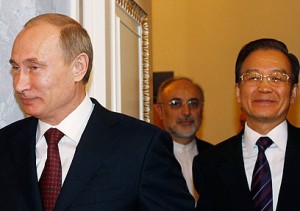Special to WorldTribune.com
By Fariborz Saremi, FreePressers.com
China, Russia and Iran are widely considered to be allies and partners.They form a strategic barrier directed against U.S. expansionism. The three countries form a triple alliance which constitutes the core of a Eurasian coalition directed against U.S. encroachment into Eurasia and its quest for global hegemony.
Iran can be characterized as a geostrategic pivot.The geostrategic equation in Eurasia very much hinges on the structure of Iran’s political alliances. This also pertains to Iran’s ethno-cultural, linguistic, economic, religious and geopolitical links to Central Asia.

Were Iran to become an ally of the United States, this would seriously hamper Russia and China. Moreover, were the structure of political alliances to shift in favor of the U.S., Iran could also become the greatest conduit for U.S. influence and expansion in Central Asia.
In such a scenario, Russia as an energy corridor would be weakened as Washington would unlock Iran’s potential as a primary energy corridor for the Caspian Sea Basin, implying de facto U.S. geopolitical control over Iranian pipeline routes.
If Iran were to change camps and enter the U.S. sphere of influence, China’s economy and national security would also be held hostage on two courts. Chinese energy security would be threatened directly because Iranian energy reserves would no longer be secure and would be subject to U.S. geo-political interests. Additionally Central Asia could also re-orient its orbit should Washington open a direct and enforced conduit from the open seas via Iran.
Thus both Russia and China want a strategic alliance with Iran as a means of screening them from the geopolitical encroachment of the United States.
There is a major misreading of past Russia and Chinese support of U.N. sanctions against Iran. Even though Beijing and Moscow allowed U.N. security council sanctions to be passed against their Iranian ally, they did it for strategic reasons namely with a view to keeping Iran out of Washington’s orbit. Russia and China would never support crippling sanctions or any form of economic embargo that would threaten Iranian national security. This is why both China and Russia have refused to be coerced by Washington into joining its new 2012 unilateral sanctions.
In August 2011, the head of the Supreme National Security of Iran Saeed Jalili and the head of the National Security Council of the Russian Federation Nikolai Platnovich Patrushev met in Teheran to discuss the Iranian nuclear energy program as well as bilateral cooperation. Russia wanted to help Iran rebuff the new wave of accusations by Washington directed against Iran.
In September 2011, Dmitry Rogozin, the Russian envoy to NATO announced that he would be visiting Teheran in the near future to discuss the NATO missile shield project both Russia and Iran oppose. In October 2011, Russia and Iran announced that they will expand ties in all fields. Soon after, in November 2011 Iran and Russia signed a strategic cooperation and partnership agreement between their highest security bodies covering economics, security, military and intelligence.
On Jan. 13, Rogozin who had been appointed deputy prime minister of Russia declared that any attempted military intervention against Iran would be a threat to Russia’s national security. In other words, an attack on Tehran is an attack on Moscow. In 2007 Putin essentially mentioned the same thing when he was in Teheran for a Caspian Sea Summit. Rogozin’s statement is merely a declaration of what has been the position of Russia all along: should the Islamic Republic of Iran fall, Russia would be in danger.
Iran is a target of U.S. interests not just for its vast energy reserves and natural resources but because of other geostrategic considerations. Washington wants Iranian energy exports to be traded in U.S. dollars to insure the continued use of U.S. dollar in international transactions. In January both Russia and Iran replaced the U.S. dollar with their national currencies respectively, the Russian ruble and the Iranian Rial, in their bilateral trade.This was an economic and financial blow to the United States.
Russia and China with Iran are all staunchly supporting Syria. The diplomatic and economic siege against Syria is tied to the geopolitical stakes to control Eurasia. The instability in Syria is tied to the objective of combating Iran and ultimately turning it into a U.S. partner against Russia and China.
Aside from its naval ports in Syria, Russia does not want to see Syria used to re-route the energy corridors in the Caspian Basin and the Mediterranean Basin. If Syria were to fail, these routes would be re-synchronized to reflect a new geopolitical reality. At the expense of Iran, energy from the Persian Gulf could also be re-routed to the Mediterranean through both Lebanon and Syria.

You must be logged in to post a comment Login